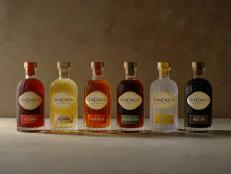This Week's Nutrition News Feed

In this week's news: Yogurt discovers its savory side; scientists look into the problems of piling on the protein; and caramel coloring gets a red flag.
Blue Hill Farm, annex of New York's famed Blue Hill eateries, is making its mark on the yogurt scene. Instead of offering the conventional fruit-filled varieties, the high-end farm-to-fork establishment is spooning out concoctions that are 30 percent vegetable puree. The yogurts -- made with dairy from grass-fed cows and selling in a small number of Whole Foods markets -- are available in six flavors: tomato, carrot, beet, butternut squash, sweet potato and parsnip.
Protein-heavy diets such as Paleo and Dukan are still wildly popular for weight loss. But a new study suggests they might not be so popular with dieters' kidneys. The small study, conducted on rodents, found that animals following a high-protein diet did lose weight but also experienced an increased risk of kidney stones and other symptoms associated with kidney failure.
A recent study published in the American Journal of Gastroenterology further suggests that quinoa is a good pick for those with celiac disease who must follow a gluten-free diet. The nutrient-dense seed (technically speaking, quinoa is not a grain) offers a plentiful amount of nutrients, including many that people with celiac disease need more of.
That said, quinoa's time in the spotlight might be up. Teff, a grain native to Ethiopia, is getting a lot more attention lately. Rich in iron, protein and calcium, the finely textured gluten-free grain can be cooked as porridge or used as replacement for wheat flour in recipes for breads and other baked goods.
The most common food coloring in the world has been called out by Consumer Reports. Caramel coloring, found in root beer, cola drinks, bottled tea and other beverages, contains a potentially carcinogenic substance called 4-methylimidazole (4-Mel). California requires a warning label on products that contain more than 29 micrograms, but the amounts of 4-Mel found in popular drinks varies greatly across brands and in states where the drinks are manufactured. In light of this recent report, more states may follow California's example and place warning labels on high-risk foods. Better yet, food manufacturers may start using less of the additive.
Dana Angelo White, MS, RD, ATC, is a registered dietitian, certified athletic trainer and owner of Dana White Nutrition, Inc., which specializes in culinary and sports nutrition. See Dana's full bio »


































